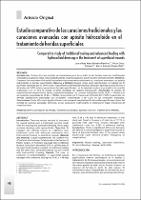| dc.contributor.author | Romero-Ramírez, Laura Rosa Maira | |
| dc.contributor.author | Soto-Cáceres, Víctor | |
| dc.contributor.author | Gómez-Díaz, Marco Antonio | |
| dc.date.accessioned | 2023-06-13T15:09:33Z | |
| dc.date.available | 2023-06-13T15:09:33Z | |
| dc.date.issued | 2019-02-18 | |
| dc.identifier.citation | Revista del Cuerpo Médico Hospital Nacional Almanzor Aguinaga Asenjo. 2016; 9(1). | es_PE |
| dc.identifier.uri | https://hdl.handle.net/20.500.12959/3898 | |
| dc.description.abstract | Introducción: Existen diversos métodos de tratamiento para la curación de las heridas como los tradicionales realizados con apósitos secos y los avanzados donde se aplican apósitos oclusivos como los hidrocoloides. Objetivo: Comparar los resultados clínicos del tratamiento con curaciones tradicionales y curaciones avanzadas con apósito hidrocoloide en heridas superficiales. Material y Métodos: Ensayo clínico cuasi experimental. Se trabajó con 47 pacientes atendidos por el Servicio de Cirugía Plástica del Hospital Nacional Almanzor Aguinaga Asenjo de julio a diciembre del 2013 quienes presentaron heridas superficiales; en la mitad de su área se procedió a la curación tradicional y en la otra se realizó curación avanzada con apósito hidrocoloide. Resultados: El tiempo de reepitelización completa en la herida superficial manejada con curación tradicional fue de 14,62 ± 1,98 días y en las curaciones avanzadas de 12,66 ± 1,90 días. Se encontró una frecuencia de infección del 17,02% en pacientes con heridas superficiales manejados con curaciones tradicionales y de 4,26% en las curaciones avanzadas. Conclusiones: Existe diferencia significativa entre el tiempo de reepitelización de heridas superficiales a favor del método de curación avanzada. Asimismo, en las curaciones tradicionales se presentaron mayor frecuencia de complicaciones. | es_PE |
| dc.description.abstract | Introduction: There are various methods of treatment
for wound healing such a traditional methods made
with dry dressing and advanced methods which apply
occlusive dressings with hydrocolloids. Objective: To
compare the clinical results of treatment with
traditional cures and advanced treatments with
hydrocolloid dressing in superficial wounds. Material
and Methods: A quasi-experimental. We worked with
47 patients who had superficial wounds in the Service of
Plastic Surgery of Almanzor Aguinaga Asenjo National
Hospital from july to december 2013. At half the area of
the superficial wound proceeded to traditional healing
and the other half, advanced healing was performed
with hydrocolloid dressing. Results: The time to
complete re-epithelialization in superficial wound
managed with traditional healing was 14.62 ± 1.98 days
and 12.66 ± 1.90 days in advanced treatments. In this
study was found a frequency of infection of 17.1% in
patients with superficial wounds managed with
traditional cures and 4.26% in advanced healing.
Conclusions: There is significant difference between
the time of re-epithelialization of superficial wounds in
favor of advanced method. Also, in the present study
traditional cures showed greater frequency of
complications. | es_PE |
| dc.format | application/pdf | es_PE |
| dc.language.iso | spa | es_PE |
| dc.publisher | Seguro Social de Salud (EsSalud) | es_PE |
| dc.relation.uri | http://cmhnaaa.org.pe/ojs/index.php/rcmhnaaa/article/view/150 | es_PE |
| dc.rights | info:eu-repo/semantics/openAccess | es_PE |
| dc.rights.uri | https://creativecommons.org/licenses/by-nc-sa/4.0/ | es_PE |
| dc.subject | Cicatrización de heridas | es_PE |
| dc.subject | Tratamiento avanzado | es_PE |
| dc.subject | Apósitos oclusivos | es_PE |
| dc.subject | Wound healing | es_PE |
| dc.subject | Advanced treatment | es_PE |
| dc.subject | Occlusive dressings | es_PE |
| dc.title | Estudio comparativo de las curaciones tradicionales y las curaciones avanzadas con apósito hidrocoloide en el tratamiento de heridas superficiales | es_PE |
| dc.title.alternative | Comparative study of traditional healing and advanced healing with hydrocolloid dressing in the treatment of superficial wounds | es_PE |
| dc.type | info:eu-repo/semantics/article | es_PE |
| dc.subject.ocde | https://purl.org/pe-repo/ocde/ford#3.02.11 | es_PE |
| dc.identifier.doi | https://doi.org/10.35434/rcmhnaaa.2016.91.150 | |






